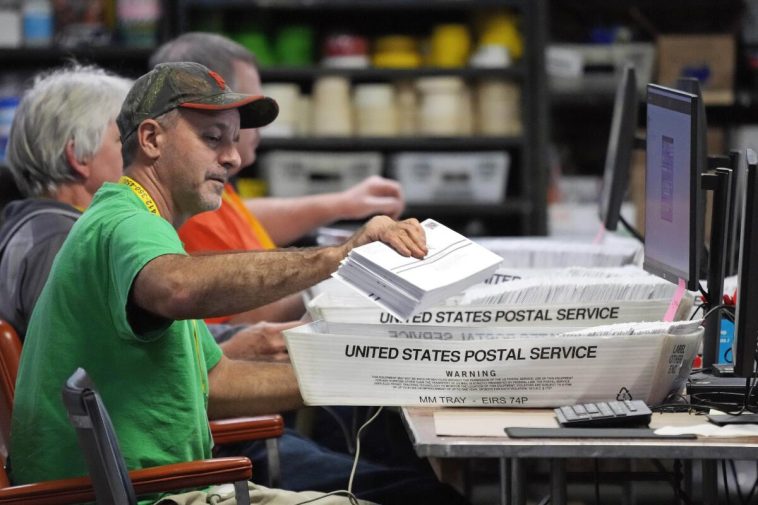In a potentially precedent-setting case related to the treatment of undated mail-in ballots in Pennsylvania, a federal judge has recently issued a ruling that can impact future elections significantly. Interestingly, U.S. District Judge Susan Paradise Baxter, who is a registered Democrat appointed by former President Donald Trump in 2018, made the statement that Pennsylvania’s law, which insists that undated ballots are not valid for counting, contradicts U.S. law.
Judge Baxter’s decision was pivoted on the interpretation that the stringent Date Requirement, as enforced by the Commonwealth, breaches the Materiality Provision of the Civil Rights Act. She conveyed her confidence in the validity of the plaintiffs’ motion for summary judgment and subsequently found it unnecessary to further explore any constitutional claims within this meaning. Accordingly, she has decided to dismiss the plaintiffs’ claim for equal protection.
This case echoes a similar lawsuit in 2022 where the U.S. Supreme Court yielded a judgement that nullified a lower court’s ruling related to a Pennsylvania county judge’s race. That case too revolved around questions of ballot validity after the defeat was accepted by the Republican candidate.
However, it’s worth noting that three Supreme Court Justices, Samuel Alito, Clarence Thomas, and Neil Gorsuch, have expressed their uncertainties about interpreting the non-acceptance of ballots, missing handwritten dates, as a violation of the Civil Rights Act.
Among the plaintiffs of the case under Judge Baxter’s jurisdiction are the Pennsylvania State Conference of the NAACP and the campaign committees of the Democratic Party for U.S. House and the Senate candidates. Their arguments pivot on the allegation that the non-acceptance of non-dated ballots infringes upon the 1964 Civil Rights Act. According to this act, any ‘error or omission’ in ‘applications, registrations, or other acts requisite to voting’ should not hinder the voting right if the said errors are non-consequential for voting qualification.
It’s rather crucial to note that the primary beneficiaries of mail-in voting practices have customarily been Democratic voters. This methodology has, however, been subject to questioning and skepticism from members of the Republican party. The controversial issue of mail-in voting took center stage of rampant allegations of voter fraud during the 2020 election.
June 2022 witnessed another landmark judgment from the U.S. Supreme Court as they validated the counting of non-dated mail-in ballots during a contested Pennsylvania local election. The verdict, passed by a majority of 6-3, bears significant ramifications for tight races during the upcoming November midterm elections.
Voting rights would be violated by discounting ballots that were timely received yet lacked a return envelope’s handwritten date— so claimed a federal appeals court ruling that was reinstated by the Supreme Court, against the opposition of three justices. This was reported by ABC News.
Pennsylvania state law requires voters to inscribe a date next to their signature, while it’s a common practice for election officials to postmark and date mail ballots upon receipt. The appeals court found the missing handwritten date to be negligible.
In refraining from elaborating on its decision, the Supreme Court didn’t set a binding precedent. Nonetheless, the decision suggests that the majority of the justices agree that discarding ballots over minor administrative errors or omissions significantly jeopardizes the franchise, as per the report.
Justice Alito expressed an opinion contrary to the court’s ruling, articulating that the Third Circuit’s opinion is ‘very likely wrong.’ In his belief, a vote miscounted due to procedural missteps do not amount to the denial of the voter’s ‘right to vote.’ Instead, they consider it as a non-compliance with the rules of casting a vote.
Meanwhile, similar court cases revolving around mail-in ballots have surfaced in several other states. For instance, in October 2022, just ahead of the midterms, a Wisconsin judge dismissed Democrats’ appeal to count absentee ballots with an incomplete witness address, saving the status quo and averting potential confusion with two weeks left for voting.
This verdict was received favorably by the Republican-majority Wisconsin Legislature, which actively involved itself in the aforementioned lawsuit. The case proliferated the longstanding debate on the extent to which a witness’s address should be reported on absentee ballot certificates for the said ballot to be included in the count.



